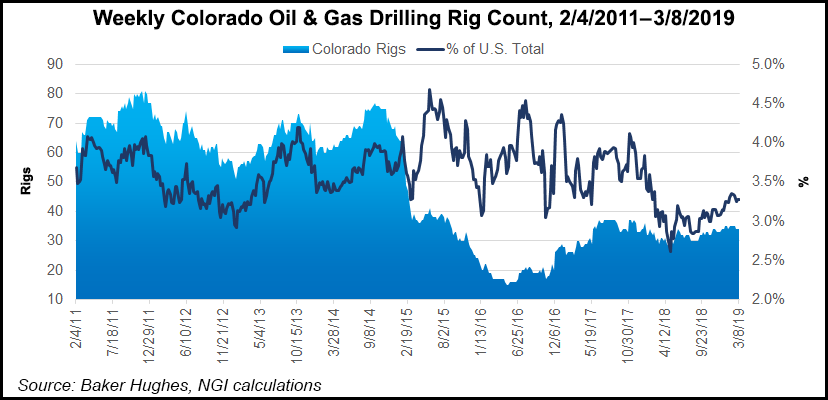Regulatory | NGI All News Access | NGI The Weekly Gas Market Report
Colorado Oil, Gas Rules Overhaul on Fast Track to Governor’s Desk
The Colorado Senate on a 19-15 vote Wednesday passed and sent to the lower House a fast-track omnibus bill to extensively reform the oil and natural gas industry, empowering local governments to the exclusion of regulators.

Proposed less than two weeks ago by Gov. Jared Polis and the General Assembly, Senate Bill 181 could be on the Democratic governor’s desk before the end of next week following expected easy passage in the state House, where there are 41 Democrats and 24 Republicans.
As originally proposed, the legislation would provide “additional public welfare protections regarding the conduct of oil and gas operations.” And its backers stressed that it is intended to “enhance local governments’ ability to protect public health, safety, and welfare, and the environment by clarifying, reinforcing and establishing their regulatory authority over the surface impacts of oil and gas development.”
However, the opposition was able to insert notable changes to the original legislation, including clarifying language aimed at preventing the Colorado Oil and Gas Conservation Commission from acting arbitrarily or capriciously in regulating industry; a stipulation that localities may only regulate to the extent that is necessary and reasonable; and creating a technical review board available to both localities and operators for appeals to well-siting decisions.
The Colorado Oil and Gas Association (COGA) and Colorado Petroleum Council (CPC) said Wednesday they appreciated those who opposed the measure in the senate, which in its revised form will still “cripple” the multi-billion-dollar energy industry.
“If signed into law, this legislation will diminish funding for critical public services, including education, health care, and road maintenance,” said COGA CEO Dan Haley and CPC spokesperson Ben Marter.
“According to an analysis released last Tuesday by the nonpartisan REMI Partnership, a 50% reduction in Colorado’s natural gas and oil production by 2030 could eliminate 120,000 jobs and remove $8 billion in tax revenue from state and local coffers.”
Efficient and safe energy should be a nonpartisan issue, the industry groups said.
“The oil and gas sector has lifted more people out of poverty, driven more innovations, and led to greater economic expansion than any other in history,” Haley and Marter said. “Our industry is leading emission reduction efforts and our member companies adhere to the most rigorous regulatory standards in the nation.”
The industry groups plan to keep fighting against what they consider “a deeply flawed measure,” and “will work with any lawmakers who are willing to listen to the truth” about the legislation. “The state deserves better.”
The state’s Consumer Energy Alliance (CEA) also registered concern and disapproval of the bill, claiming it could “dangerously curtail” new oil and gas development. “Colorado is already the leader in air and water regulatory framework in the world, and it’s also a leader in safe, economical extraction of oil and natural gas, which has rejuvenated communities and helped families and businesses of all sizes,” said CEA COO Andrew Browning.
In lobbying for the legislative proposal, Polis had called attention to Anadarko Petroleum Corp.’s abandoned gas well flowline explosion two years ago. He has said he thinks oil and gas siting and rules haven’t kept up with the industry’s technological and operating advances.
Washington, DC-based Height Capital Markets analysts said in the long-term, the legislation may be positive for Colorado’s major exploration and production players by helping deflect any efforts for a statewide drilling limitation referendum on the 2020 statewide ballot.
Raymond James & Associates Inc. said Thursday the “deep-blue House is set to easily pass the legislation,” but “it is worth emphasizing that the restrictions are much less burdensome than what Proposition 112, defeated last November, would have created.”
Nearly 57% of Colorado’s voters defeated the proposition, which would have increased well site setbacks to 2,500 feet from 500 feet for residences and workplaces, as well as “vulnerable areas” such as playgrounds and public water sources.
© 2024 Natural Gas Intelligence. All rights reserved.
ISSN © 1532-1231 | ISSN © 2577-9877 | ISSN © 1532-1266 |
